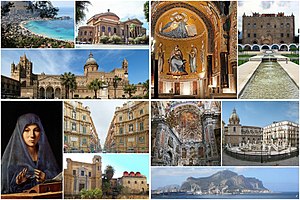Palermo
| Palermo | |||
|---|---|---|---|
| Comune | |||
| Città di Palermo | |||

Clockwise from top: Mondello, Teatro Massimo, Cappella Palatina, Zisa, Cathedral, Virgin Annunciate of Antonello da Messina, Quattro Canti in Maqueda Street, Churches of Martorana and San Cataldo, Interior of Santa Caterina Church, Pretoria Square and Mount Pellegrino
|
|||
|
|||
| Location of Palermo in Italy | |||
| Coordinates: 38°07′N 13°22′E / 38.117°N 13.367°ECoordinates: 38°07′N 13°22′E / 38.117°N 13.367°E | |||
| Country | Italy | ||
| Region | Europe | ||
| Province / Metropolitan city | Palermo (PA) | ||
| Founded | 736 BC | ||
| Government | |||
| • Mayor | Leoluca Orlando (I) | ||
| Area | |||
| • Total | 158.9 km2 (61.4 sq mi) | ||
| Elevation | 14 m (46 ft) | ||
| Population (31 January 2013) | |||
| • Total | 676,118 (city) 1,300,000 (metro) |
||
| Demonym(s) | Palermitani or Panormiti | ||
| Time zone | CET (UTC+1) | ||
| • Summer (DST) | CEST (UTC+2) | ||
| Postal code | 90100 | ||
| Dialing code | 091 | ||
| Patron saint | Saint Rosalia, Saint Agata, Saint Oliva and Saint Benedict the Moor | ||
| Saint day | 14 July | ||
| Website | Official website | ||
| Country of birth | Population |
|---|---|
|
|
4,111 |
|
|
3,405 |
|
|
2,373 |
|
|
2,132 |
|
|
1,461 |
|
|
1,057 |
|
|
1,029 |
|
|
1,028 |
Palermo (Italian: [paˈlɛrmo], Sicilian: Palermu, Latin: Panormus, from Greek: Πάνορμος, Panormos, Arabic: بَلَرْم, Balarm; Phoenician: זִיז, Ziz) is a city of Southern Italy, the capital of both the autonomous region of Sicily and the Metropolitan City of Palermo. The city is noted for its history, culture, architecture and gastronomy, playing an important role throughout much of its existence; it is over 2,700 years old. Palermo is located in the northwest of the island of Sicily, right by the Gulf of Palermo in the Tyrrhenian Sea.
The city was founded in 734 BC by the Phoenicians as Ziz ('flower'). Palermo then became a possession of Carthage, before becoming part of the Roman Republic, the Roman Empire and eventually part of the Byzantine Empire, for over a thousand years. The Greeks named the city Panormus meaning 'complete port'. From 831 to 1072 the city was under Arab rule during the Emirate of Sicily when the city first became a capital. The Arabs shifted the Greek name into Balarm, the root for Palermo's present-day name. Following the Norman reconquest, Palermo became the capital of a new kingdom (from 1130 to 1816), the Kingdom of Sicily and the capital of the Holy Roman Empire under Frederick II Holy Roman Emperor and Conrad IV of Germany, King of the Romans. Eventually Sicily would be united with the Kingdom of Naples to form the Kingdom of the Two Sicilies until the Italian unification of 1860.
...
Wikipedia




